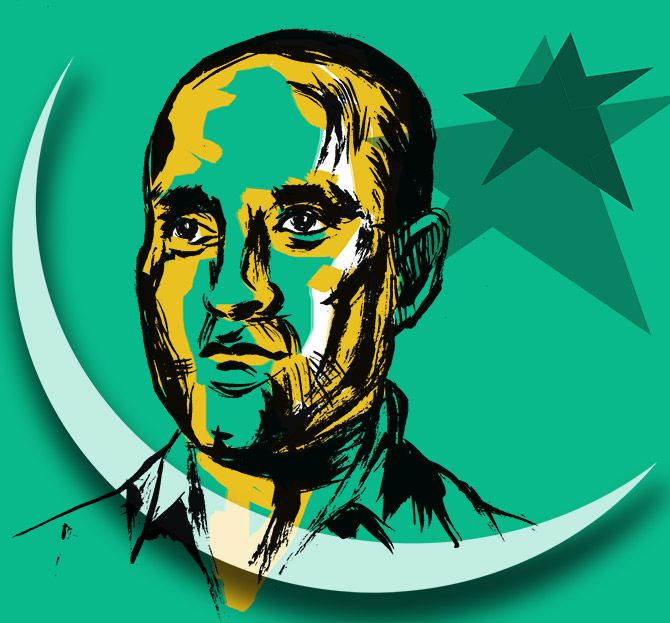'Will Muhammad Habib Zahir -- who was part of the team that arrested Kulbhushan Jadhav and went missing in Nepal -- figure in a Jadhav-for-Zahir deal?' asks Aditi Phadnis.
Illustration: Dominic Xavier/Rediff.com

It is a rare court judgment that ends up satisfying everyone.
In its order on charges of money laundering and corruption against Pakistan Prime Minister Nawaz Sharif and his family, the country's fiercely independent supreme court played Solomon and managed that feat by allowing Sharif to stay on as prime minister on the basis of 'ínsufficient evidence' (two words that had supporters of the ruling party dancing on the streets of Lahore and Islamabad), while instituting a team that will investigate the charges against him.
The court has insulted him by saying that previous probes were rigged (namely, by the national accountability board etc) and humiliated him by saying a joint investigation team will report to the court (not unlike our Central Bureau of Investigation).
To all this, the response of Sharif's daughter Maryam is to send heartfelt thanks to God ('Praise and glory be to Allah alone') suggesting that the family was expecting much worse.
The Opposition believes it has been vindicated and says Sharif has been reduced to a lame duck government -- if it has any shame, it should go on its own now.
But Sharif and his advisors see no reason to do anything drastic, now that they have a mandate from the highest court in the land.
The verdict was split -- two out of three judges said he should be disqualified.
So what are the implications: For Pakistan and for India?
There is hardly any doubt about Sharif's emasculation, whatever his family might say. But the supreme court has left several windows open for him to exercise his authority as PM.
While the order says the JIT must be headed by a senior officer of the federal investigation agency not below the rank of additional director general, who should this person be and who should select him?
The order is silent on that. So there is nothing to prevent the prime minister's office from offering post-retirement deals in return for a guaranteed outcome. The same goes for other members of the team.
Asif Zardari, co-chairperson of the Pakistan Peoples Party, put his finger on it when he asked: 'How can government officers, who are subservient to the prime minister, probe allegations against him and his family?'
On other matters in his jurisdiction, the court order means nothing for Sharif. He will continue to be the top boss when it comes to negotiating important deals like the China Pakistan Economic Corridor and the $54 billion spending on infrastructure that it entails.
Much of the CPEC infrastructure is going to be built by private consortia and will be paid for by China and the people of Pakistan.
If all the planned projects are implemented, the value of those projects would exceed all foreign direct investment in Pakistan since 1970.
The CPEC project is expected to create some 700,000 direct jobs between 2015 and 2030 and add up to 2.5 percentage points to Pakistan's growth rate: All adding up to a resounding 'ka-ching' in the Sharif family's cashboxes.
The Pakistan army is completely immersed in Operation Radd-ul-Fasaad aimed against an assortment of Islamic radicals/terrorists.
Hasnain Malik of the well-known investment banking firm Exotix assesses that deaths related to terror were down 40 per cent year on year in Q1 2017.
The Pakistan Muslim League Nawaz's parliamentary majority is so huge that the ruling party outnumbers all others in the lower house even if they join together tactically. So there's nothing to stop Sharif from rolling out his administrative agenda.
If Sharif advances the general election, due Q2 2018, it is almost certain that he will be voted in again, given the disarray in the Opposition.
What does all this mean for India?
The current glitch in relations caused by Kulbhushan Jadhav needs to be ironed out fast: The two prime ministers will be meeting in Kazhakhstan for the Shanghai Cooperation Organisation summit in the first week of June.
Both countries will become full members of SCO at the meeting. Obviously, Narendra Modi and Nawaz Sharif will shake hands.
But will the meeting be more than that? And how will the background be set by the bureaucracies in the two countries?
Will Lieutenant Colonel Muhammad Habib Zahir -- who was part of the team that arrested Jadhav and went missing in Nepal -- figure in a Jadhav-for-Zahir deal? We will never know.
After weeks of anxiety over the Pakistan supreme court order (written in February but read out only in April) the Sharif administration is functional once again.
There is no talk of Sharif going to London for medical treatment and staying there.
The family has taken charge and we now have to watch for the next chapter in this endlessly entertaining subcontinental drama of power and authority, which would be comical were it not for the collateral damage it causes to the people of both countries.
MUST READ features on the KULBHUSHAN JADHAV CASE in the RELATED LINKS BELOW...











 © 2025
© 2025